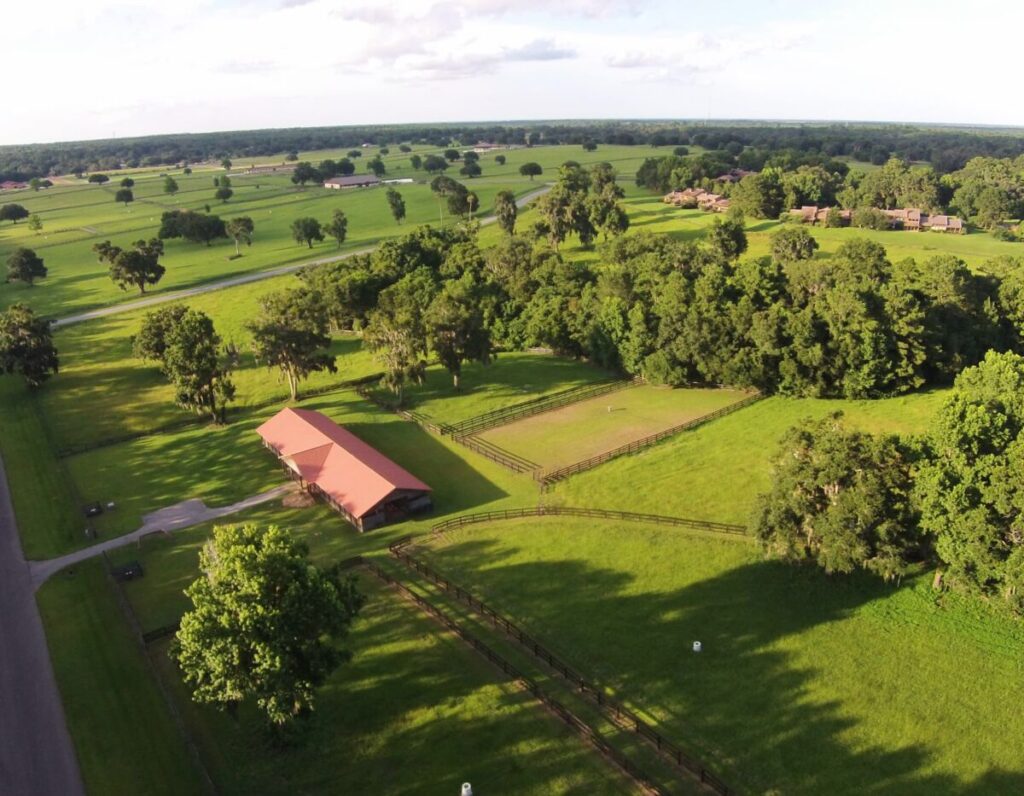Horse farms, forever?
Farmland preservation area has a slippery slope

The old Ocala Jockey Club farm.
In the current edition of the Ocala Gazette, you’ll find a statement from Horse Farms Forever supporting a proposal from the World Equestrian Center (WEC) developers to redefine the former Ocala Jockey Club (OJC) property. The plans envision homesites as small as three acres, an RV park, a gas station, hotel, arenas, retail and restaurants.
If all of that sounds like too much activity for land within the Farmland Preservation Area (FPA), property outside the urban growth boundary that is supposed to be protected from development sprawl, you’re hardly alone.
And if you’re a bit confused as to why HFF would reverse field and support such intense development in agricultural lands after publicly opposing similar plans not two years ago, go to the head of the class.
In 2020, HFF ran a critical media print, radio and digital campaign against WEC developers warning the Marion County Commission and residents that a special land use designation negotiated by the WEC developer’s attorney Jimmy Gooding was a “Trojan Horse” for more commercial development in the Farmland Preservation Area.
“While we agree the WEC will be a great boon to our horse industry and economy, we believe it needs to be well-managed,” Busy Shires Byerly of HFF told the Planning and Zoning board at the time.
“We believe this land use category is really like a Trojan Horse,’’ she said. “It sounds and looks good, but if it is approved, it will invade the Farmland Preservation Area with undefined, intensive commercial development.”
The Trojan Horse may be making a return visit to the Marion County Commission tomorrow, but this time with a different jockey.
HFF now says in September 2021, the group did a little horse-trading with WEC developers involving the old Crupi and Plumley farms, which were purchased in 2019 and 2020 by an entity associated with the WEC developers named Golden Ocala Equestrian Land LLC.
In the deal, the WEC developer would seek to change the zoning at the 256-acre Crupi and 247-acre Plumley properties from business to agricultural, “and to develop these properties into farms of 10-acres or larger.” In return, the HFF would support WEC’s plans for the Ocala Jockey Club.
Bernie Little, CEO for HFF, said none of this was in writing. Rather, it’s more as a “you go first” arrangement: The WEC developers would seek to reduce the zoning, and HFF would support WEC’s plans.
Conspicuously absent from these chats were other owners of property around the OJC.
Speaking of concerned neighbors, both the Crupi and Plumley farms are a stone’s throw of the farm Little holds interest in under a corporate entity, Misty Lane, LLC. We’d estimate from looking at property records that the Plumley farm is approximately 200 feet down the road.
Little said HFF’s public relations efforts are not meant to bolster the project in front of the commissioners, who take up the project tomorrow. Instead, it aims to “build brand awareness for Horse Farms Forever.”
In a letter to the Ocala Gazette published on Sunday, Feb. 27, Little wrote, “I am aware of the negative reaction to our position from many of the residents in the area around the Jockey Club property, and I understand that. If you’ve looked at 1,000 acres of open pasture for decades, it’s understandable to want it to always look like that. With that said, and I say this with no disrespect for anyone’s opinion, I think it was naive to think that any new owners of the OJC property were not going to develop it. That leaves the question, how best can an organization like Horse Farms Forever get a seat at the table to help monitor and influence that development?”
The old Ocala Jockey Club is no doubt a valuable equine venue. However, why are some of our community’s biggest advocates for conserving agricultural land in the preservation area willing to bend the rules for a wealthy developer at the cost of the very farms they purport to protect?
Essentially, HFF has taken the position that commercial development, so long as its equine related, should be the exception to the FPA.
Is there is a little self-dealing for preservation that benefits certain favored farm owners, and not others?
Who gave this private nonprofit group the authority to decide whose farms deserve protection and whose don’t? Little told the Gazette there was no coordination on the deal between HFF and the commissioners.
Little claims HFF is being transparent in its efforts. In the same Feb. 27 letter, Little referenced HFF’s mission and wrote, “If you think about it, as a nonprofit organization focused on preserving horse farms in Marion County, the only product we have to sell is trust.”
Little concluded in his letter that “the WEC Jockey Club would do more for farmland preservation in that area than anything Horse Farms Forever could ever do. I believe that firmly.”
Sadly, that leaves some of the smaller farms without seats on a “preservation” board up against billionaire developers.
Who are the final checks and balances to all of this? Our elected officials and the public.
As to HFF claim of being “watchdogs,” this paper would like to point out that true watchdogs treat everyone the same, regardless of how much money they have, or how many treats they might carry in their pockets.





